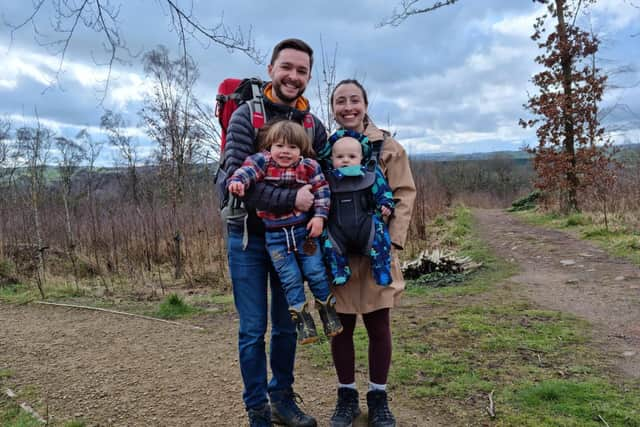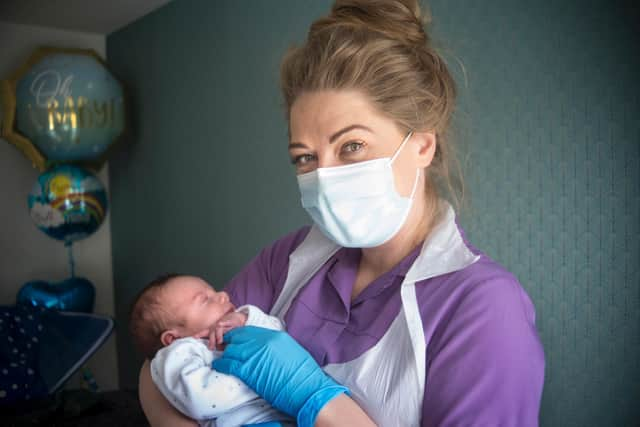Yorkshire Midwives On Call: New show to look at Bradford midwives delivering babies at home
When Rebecca Wheelhouse and Tim Sale welcomed their second son, Toby, into the world, it was from the comfort of their own home.
It is no doubt a home that has been the setting of a number of births over its 200-year history, but perhaps not another like Toby’s - one that was filmed to be broadcast on television.
Advertisement
Hide AdAdvertisement
Hide AdFrom that same home, Tim and Rebecca will relive their experience when their story features on-screen as part of a brand new series following the work of a team of Bradford midwives.


Expect drama, emotion and tender moments as Yorkshire Midwives On Call captures the creation of new families in homes across the Bradford district.
“There’s a cringe factor about seeing yourself on screen and hearing your own voice,” 28-year-old Rebecca muses. “But I am excited. It’s really special, it’s an opportunity for all our friends and family to see this very life changing event and we wouldn’t have got that otherwise without doing the show.”
The five-part series goes behind the scenes of the Homebirth Midwifery unit at Bradford Teaching Hospitals NHS Foundation Trust. The team of six midwives are on-call twenty four hours a day, specialising in delivering babies in people’s own homes. All of them are busy working mums themselves, but when the phone from a labouring woman rings they spring into action, whatever time of day or night.


Advertisement
Hide AdAdvertisement
Hide Ad“There’s never a stereotypical day,” head midwife Laura Hughes says. “You can start off with the most logical plans and then three people will go into labour on the same day or you’ll have a birth every night for three nights in a row and it throws a spanner in the works in terms of any planning.
“So we all have to live life open to flexibility and plans changing. I think that’s definitely the most tricky thing is trying to make sure that we provide this really thorough service to women but with the unpredictability of when babies are going to be born thrown into the mix.”
Bradford’s specialist home birth team was only formed three years ago. Staff speak of a rise in the number of women wanting home births since then and midwife Michaela Walsh tells The Yorkshire Post that the team’s caseload has grown from around 50 people prior to the Covid-19 pandemic to around 150 today. Word of mouth has been one factor contributing to that.
“People are becoming aware of the fact that we’ve got a dedicated home birth team now and telling family and friends,” Michaela, 42, says.
Advertisement
Hide AdAdvertisement
Hide AdCovid itself has also had an impact. When the virus has been particularly prevalent, some women have been concerned about entering a hospital environment and have instead explored home birth as an option.
Part of the appeal for many choosing to go down that route is birthing in familiar surroundings - and having greater control over who is with them when the baby is delivered.
“I think being at home, people feel like they are a bit more in control of their experience,” says Laura, 34, who has been a midwife since 2011, “When people go to hospital, you tend to find that they almost hand themselves over to the process for things to be done to them. At home it’s very different.
“I think people feel empowered to make their birth experience what they want it to be like. They love the fact that they have two midwives that are with them all the time - you don’t get that in hospital...so I think people feel like they get really individualised care.
Advertisement
Hide AdAdvertisement
Hide Ad“I think as well, the family setting they can make it what they want to be - they can have their kids there, they can have more than one birth partner. I think it’s quite an empowering experience for women to feel like they’ve done it on their own terms.”
For Rebecca and Tim, having Toby at home in Saltaire meant their eldest son Freddie, now two, could meet his little brother soon after the birth. It’s a pleasant thought for them too that Toby, now six months, is likely one of many babies to be born in the property.
“We don’t know much about who has previously lived here,” Tim says, “but it’s reasonable to think there was at least 10 people in every house in Saltaire because of the number of mill workers there was...The house was built in the 1800s, Victorian age so it’s got a lot of history. We assume there’s been some more babies born here in the past and it’s a nice thought to think we’ve added another one!”
Between them the homebirthing team of midwives have delivered hundreds of babies, each safe arrival a rewarding reminder of why they do the job. They often get to know their patients well, seeing women from early on in their pregnancies right through to carrying out postnatal visits.
Advertisement
Hide AdAdvertisement
Hide Ad“When you’re seeing someone in their own surroundings and meeting their partner and you’ve met their kids, their dogs, you see their whole house and lifestyle, it almost creates a more vivid picture of somebody,” Laura says.
“I feel like you get to know them a bit more when you see them in that environment...I think we give away a bit of ourselves as well. You’ll end up having chats about other stuff not necessarily pregnancy related in order to build that relationship. I think that’s a two way street that us and the women feel the benefits of, a deeper connection than we might have had otherwise.”
It’s something that Rebecca felt with her midwife Michaela. “You almost don’t want to be discharged from their care,” she says. The trainee GP says she had a”positive” hospital birth with Freddie and only made the decision later on in her pregnancy to have a home birth with Toby.
Tim, 30, who is a training anaesthetist says he initially had reservations. “We both work in hospitals and I’ve looked after women in labour who have had problems and bleeds and things and that was the first thing I thought,” he says.
Advertisement
Hide AdAdvertisement
Hide Ad“If there was any concern about the baby or Rebecca, we wouldn’t have been at home,” he adds. “But the fact everything had been normal meant we had the best possible chance of having a straightforward birth.”
Rebecca hopes the programme will help to highlight that home births can be a safe option for many people. “It’s not that well known even amongst our profession that home births are as safe as they are. When I told my friends who are medics, they all thought I was crazy…I actually ended up having to send them all guidance.”
Laura and Michaela have similar hopes for the show too - to spread the word about home birth as an option for people in the hope that more women from all walks of life take it up - and that more trusts develop resources dedicated to it.
“We want everybody [in Bradford] to know we are there and that it’s an option for them,” Michaela says. “And to take that further to other trusts. We have women who have rented Air BnBs to be birthed by us because the service is not offered in their own area and they come here to have that home birth experience. We hope this raises awareness among other trusts and gets more home birth teams elsewhere too.”
Advertisement
Hide AdAdvertisement
Hide AdThe NHS offers information about choices on where to give birth, including at home, in a unit run by midwives or in hospital. For people with medical conditions, a hospital birth is generally safest, it explains, where specialists are available in case treatment is needed in labour.
If you’re having your second baby, a planned home birth is as safe as having your baby in hospital or a midwife-led unit, the NHS says. In general, when giving birth at home, people are less likely to need assistance such as forceps or ventouse.
Yorkshire Midwives On Call has been produced by Candour Productions. It airs on Monday, April 18 at 8pm on BBC Two.
